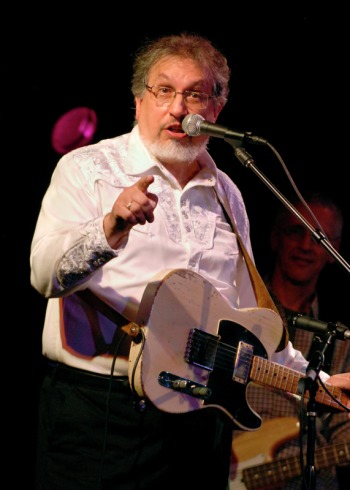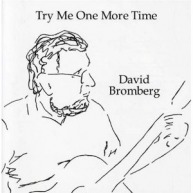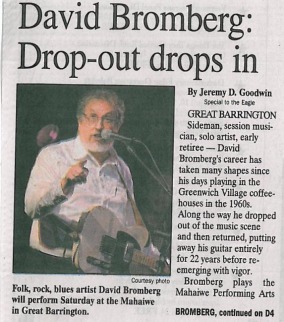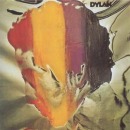David Bromberg: Drop-out drops in
Published in Berkshire Eagle, 4/9/10

'Hey, 'Self Portrait' is underrated!'
By Jeremy D. Goodwin
GREAT BARRINGTON—Sideman, session musician, solo artist, early retiree—David Bromberg's career has taken many shapes since his days playing in the Greenwich Village coffeehouses in the 1960's. Along the way he dropped out of the music scene and then returned, putting away his guitar entirely for 22 years before re-emerging with vigor.
Bromberg plays the Mahaiwe Performing Arts Center with his quartet on Saturday. Opening act is Angel Band, featuring Bromberg as accompanist on acoustic guitar.
These days he alternates between a host of musical projects. In addition to his quartet (and accompanist duties when Angel Band tours with him), Bromberg helms a nine-person big band, tours with Hot Tuna's Jorma Kaukonen, and plays solo gigs.
He has a different repertoire for each, he says, featuring, for instance, blues when playing with Kaukonen. The quartet—including bassist Butch Amiot, fiddler Nate Grower and Mitch Corbin on guitar and mandolin—is "arguably the most versatile of the the things I do," Bromberg says. The unit plays a mix of string music, blues, Bromberg originals, bluegrass and "occasional tunes where the blues met Dixieland."
Known primarily for his chops on guitar, Bromberg says it's an effort to keep up with his band.
"There's a lot of really good instrumental playing that goes on with the quartet. The three players that I'm playing with are all pretty fantastic. I'm having to practice quite a bit to keep up," Bromberg says in a telephone interview from the violin store he owns and operates. Regarding the 22-year old Grower, Bromberg says "I think the only term is 'off the hook.' He's phenomenal, and he really makes the rest of us work."
Bromberg's story is an unusual one in music business terms. Already an accomplished studio musician and sideman, he emerged into broader public acclaim with an unscheduled set at the Isle of Wight music festival in 1970. He recorded a series of solo albums and toured, before giving it all up in 1980 and changing directions entirely.
“I got burned out, but I didn’t know it was burn-out,” he reflects. “I thought I wasn’t a musician anymore. I wasn’t writing or practicing. And I didn’t want to be one of those musicians who ends up ‘phoning it in.’ Music was too important to me to treat it that way.”
He moved to Chicago to attend the Kenneth Warren School of Violin Making, and eventually moved to Wilmington, Delaware in 2002, where he opened his violin store. (He appraises, buys and sells. He also collects as a hobby, and says his own personal collection of nearly 300 violins is “the largest and best collection of violins made in the United States that has ever existed.”) Except for a new studio album released in 1990, he had been quiet on the popular music front.
GREAT BARRINGTON—Sideman, session musician, solo artist, early retiree—David Bromberg's career has taken many shapes since his days playing in the Greenwich Village coffeehouses in the 1960's. Along the way he dropped out of the music scene and then returned, putting away his guitar entirely for 22 years before re-emerging with vigor.
Bromberg plays the Mahaiwe Performing Arts Center with his quartet on Saturday. Opening act is Angel Band, featuring Bromberg as accompanist on acoustic guitar.
These days he alternates between a host of musical projects. In addition to his quartet (and accompanist duties when Angel Band tours with him), Bromberg helms a nine-person big band, tours with Hot Tuna's Jorma Kaukonen, and plays solo gigs.
He has a different repertoire for each, he says, featuring, for instance, blues when playing with Kaukonen. The quartet—including bassist Butch Amiot, fiddler Nate Grower and Mitch Corbin on guitar and mandolin—is "arguably the most versatile of the the things I do," Bromberg says. The unit plays a mix of string music, blues, Bromberg originals, bluegrass and "occasional tunes where the blues met Dixieland."
Known primarily for his chops on guitar, Bromberg says it's an effort to keep up with his band.
"There's a lot of really good instrumental playing that goes on with the quartet. The three players that I'm playing with are all pretty fantastic. I'm having to practice quite a bit to keep up," Bromberg says in a telephone interview from the violin store he owns and operates. Regarding the 22-year old Grower, Bromberg says "I think the only term is 'off the hook.' He's phenomenal, and he really makes the rest of us work."
Bromberg's story is an unusual one in music business terms. Already an accomplished studio musician and sideman, he emerged into broader public acclaim with an unscheduled set at the Isle of Wight music festival in 1970. He recorded a series of solo albums and toured, before giving it all up in 1980 and changing directions entirely.
“I got burned out, but I didn’t know it was burn-out,” he reflects. “I thought I wasn’t a musician anymore. I wasn’t writing or practicing. And I didn’t want to be one of those musicians who ends up ‘phoning it in.’ Music was too important to me to treat it that way.”
He moved to Chicago to attend the Kenneth Warren School of Violin Making, and eventually moved to Wilmington, Delaware in 2002, where he opened his violin store. (He appraises, buys and sells. He also collects as a hobby, and says his own personal collection of nearly 300 violins is “the largest and best collection of violins made in the United States that has ever existed.”) Except for a new studio album released in 1990, he had been quiet on the popular music front.

Bromberg learned, at a lunch with the city's mayor, that the street where his store was located had once boasted a thriving live music scene. Feeling he could do something to help revive it, Bromberg started two regular jam sessions—one acoustic and the other focused on Chicago-style blues.
"I figured I'd endure it for a couple of months and then let it live or die. But it wasn't a question of enduring; I just had a great time. And I realized how much I enjoyed playing."
Bromberg resumed touring sporadically, though it was a few years before he entered a recording studio and “just horsed around,” he recalls.
Seldom lingering on a tune for more than one or two takes, Bromberg recorded a series of favorites, including traditional tunes, well-known songs written by others, and some originals. The result was 2007’s Try Me One More Time, an album which landed a Grammy nomination for Best Traditional Folk Album.
It thrust Bromberg back into the national conversation in a way he hadn’t been in years, and propelled his continuing work touring the country, playing the diverse body of music that he loves.
Though he didn’t expect to win the award—Levon Helm was receiving a Lifetime Achievement Award that year and also nominated in the same category, so Bromberg assumed, rightly, the former The Band drummer would win—Bromberg attended the ceremony, had a great time, and relished the hard-earned recognition.
“This is the first time my name was ever mentioned in the same sentence as ‘Grammy.’ When you consider how many records in any given category are put out that year, it was nice to be recognized so much. A lot of people go through their whole lives without getting that. It made me feel good,” he says.
"I figured I'd endure it for a couple of months and then let it live or die. But it wasn't a question of enduring; I just had a great time. And I realized how much I enjoyed playing."
Bromberg resumed touring sporadically, though it was a few years before he entered a recording studio and “just horsed around,” he recalls.
Seldom lingering on a tune for more than one or two takes, Bromberg recorded a series of favorites, including traditional tunes, well-known songs written by others, and some originals. The result was 2007’s Try Me One More Time, an album which landed a Grammy nomination for Best Traditional Folk Album.
It thrust Bromberg back into the national conversation in a way he hadn’t been in years, and propelled his continuing work touring the country, playing the diverse body of music that he loves.
Though he didn’t expect to win the award—Levon Helm was receiving a Lifetime Achievement Award that year and also nominated in the same category, so Bromberg assumed, rightly, the former The Band drummer would win—Bromberg attended the ceremony, had a great time, and relished the hard-earned recognition.
“This is the first time my name was ever mentioned in the same sentence as ‘Grammy.’ When you consider how many records in any given category are put out that year, it was nice to be recognized so much. A lot of people go through their whole lives without getting that. It made me feel good,” he says.
Bromberg's voluminous session credits include the nadir of Dylan's studio work... which of course is still pretty awesome
|




